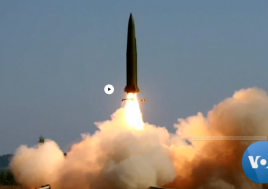Acting US Defense Secretary: China Still Top Priority
Wednesday, May 29, 2019
JAKARTA, INDONESIA —
Acting Secretary of Defense Pat Shanahan said Wednesday that China remained his top defense priority, but that message could ring hollow during his current trip to Asia as Iranian threats loom over American plans to focus on great-power competitors.
Speaking to reporters en route to Jakarta, Shanahan said threats in the Middle East and North Korea would "consume time," but the United States must not lose sight of China's growing military power.
"Implementation of the National Defense Strategy is my top priority, [and] China is the priority within the National Defense Strategy," he said in response to a question from VOA. He was referring to the Trump administration's shift from a mostly counterterror approach to a policy that focuses more on competition with Russia and China.
Shanahan has embarked on what officials call a "listening trip" to the Asia-Pacific region that aims to reassure allies of the U.S. commitment to them. Shanahan is set to deliver a major speech on U.S. military posture in Asia, with a particular focus on China, during the annual Shangri-La defense forum in Singapore later this week.
"I am not there to sell," Shanahan said.
During the forum, the acting U.S. defense secretary is expected to meet with Chinese Defense Minister Wei Fenghe. Shanahan said he would identify areas of cooperation with Beijing and candidly point out issues where China and the U.S. disagree.
The two countries are deeply entrenched in a trade war as their militaries continue to vie for influence in the region.
The U.S. military has carried out multiple freedom-of-navigation operations in the South China Sea in recent weeks to support universal passage through international spaces controversially claimed by China. U.S. military ships also have transited through the strategic Taiwan Strait at least once a month since the start of this year.
The U.S. supports self-ruled Taiwan, which China claims as its own.
Earlier this month, Shanahan identified Beijing's aggressive military buildup, theft of technology and subversion of international law as major worries.
The Pentagon refers to China as a "near peer competitor," but Bradley Bowman, a defense expert with the Foundation for Defense of Democracies, said that term was quickly becoming "outdated."
"In many areas, China now has capabilities that are as good as ours or better," Bowman said, "and I don't enjoy saying this, but it's not clear how certain conflicts might end up today, if we were to go to war with China."
North Korea
Shanahan started his trip in the U.S. state of Hawaii, where he met with Adm. Philip Davidson, head of U.S. Indo-Pacific Command, before visiting Indonesia. After the Shangri-La defense forum, Shanahan will visit with his counterparts in South Korea and Japan.
U.S. President Donald Trump and Japanese Prime Minister Shinzo Abe differed Monday on whether recent North Korean missile tests violated a U.N. Security Council resolution, but they remained united on the goal of achieving a denuclearized Korean Peninsula.
At a joint news conference in Tokyo, Trump said he viewed the tests as a bid for attention by North Korean leader Kim Jong Un and that he was not personally bothered by them. Abe, however, said the tests did violate the Security Council resolution.
Shanahan condemned the tests Wednesday and told reporters both the U.S. and Japan were committed to denuclearizing the peninsula.
"Let me just be clear, these were short-range missiles. Those are a violation" of the resolution, he said.
Michael O'Hanlon, a senior defense expert with the Brookings Institution, told VOA that while the launch was worrisome, it was not a "top-tier concern" yet.
"North Korea is signaling, I believe, that it could do more," said O'Hanlon, "and I'm afraid we have to expect more of that, not less, given the path we're on."





